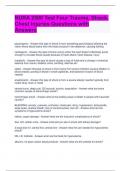NURA 2500 Test Four Trauma, Shock,
Chest Injuries Questions with
Answers
psychogenic - Answer-this type of shock is from something psychological affecting the
victim where blood drains from the head and pool in the abdomen, causing fainting
cardiogenic - Answer-the type of shock occurs when the heart doesn't effectively pump
enough to circulate blood usually because of heart attach, heart disease, injury
metabolic - Answer-this type of shock causes a loss of fluids and a change in chemical
balance from insulin, diabetic coma, vomiting, diarrhea etc
septic - Answer-this type of shock is from toxins from severe infection causing dilation of
blood vessels, pooling of blood in small capillaries, and bacterial invasion of blood
vessels
anaphylactic - Answer-this type of shock is from a severe allergic reaction typically from
insect sting, food, or meds
severe burns, deep cuts, GS wounds, trauma, amputation - Answer-what are some
common causes of hemorrhagic shock?
hemorrhagic shock - Answer-what is the leading cause of death in people with traumatic
injuries?
BLEEDING, anxiety, cyanosis, confusion, chest pain, dizzy, hypotension, tachycardia,
weak pulse, shallow breath, loss of consciousness, low UO - Answer-what are the
symptoms of hypovolemic shock?
kidney, organ damage - Answer-what are the long term complications of shock?
decr UO, amber urine - Answer-what will you see in shock with kidney damage?
2 large bore IV, central line, arterial line - Answer-what IVs are needed for hypovolemic
shock?
NS, LR, Colloids - Answer-what are the fluids for hypovolemia
albumin, he span, blood, blood products - Answer-what are the colloids for shock?
, supply water and sodium to maintain osmotic gradient - Answer-what do crystalloid
fluids do?
distribute faster, can leak - Answer-what are the pros and cons of crystalloids?
proteins pull fluid from interstitial space - Answer-what do colloids do?
doesn't leak into extravascular space (because of proteins) - Answer-what are the pros
of colloids?
hypotension, bradycardia, warm dry skin - Answer-what are the major clinical signs of
neurogenic shock?
impaired blood vessels dilate - Answer-why does neurogenic shock cause hypotension?
heart attack - Answer-what is the most common cause of cardiogenic shock?
decr HR, SV, CO, BP, tissue perfusion, dysrhy - Answer-what the the effects of
cardiogenic shock?
severe dehydration - Answer-what can cause met acidosis and metabolic shock?
tachypnea, lethargy, confusion - Answer-what are the effects of metabolic shock?
tiny clots form which can block O2 and nutrients from organs - Answer-what does
sepsis do to the body?
contusion (bruise) - Answer-this is a closed injury where the epidermis is intact and the
cells of the dermis at damaged
hematoma - Answer-this is a closed injury where there is a collection of blood beneath
the skin, lump with bluish discoloration
ICP - Answer-what is a concern with a hematoma
crush injuries - Answer-this is a closed injury where the underlying layers of skin sustain
severe damage
few external signs - Answer-what are the SS of crush injuries (what will the pt look like?)
shock - Answer-crush injuries from a sudden blow or blunt trauma may result in what?
abrasion - Answer-this open injury wound is superficial wound caused by rubbing,
scraping, or shearing
infection - Answer-what is the greatest threat from abrasion?




